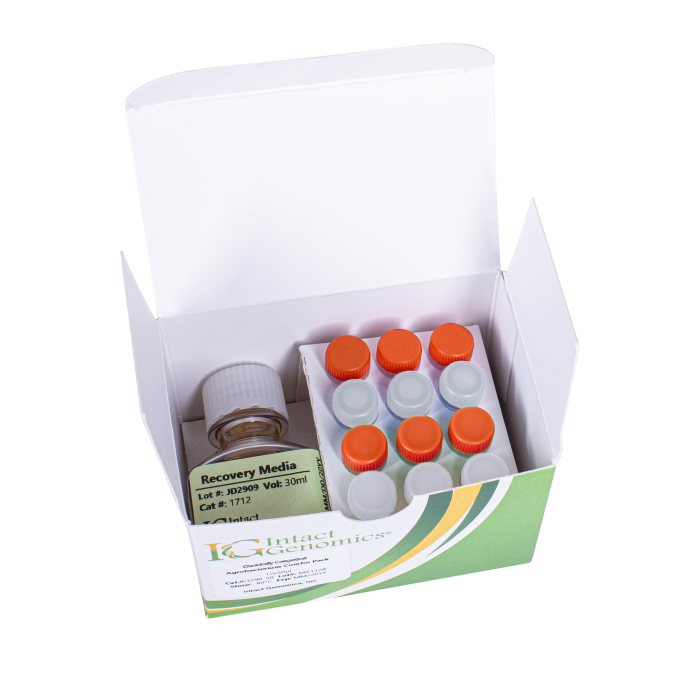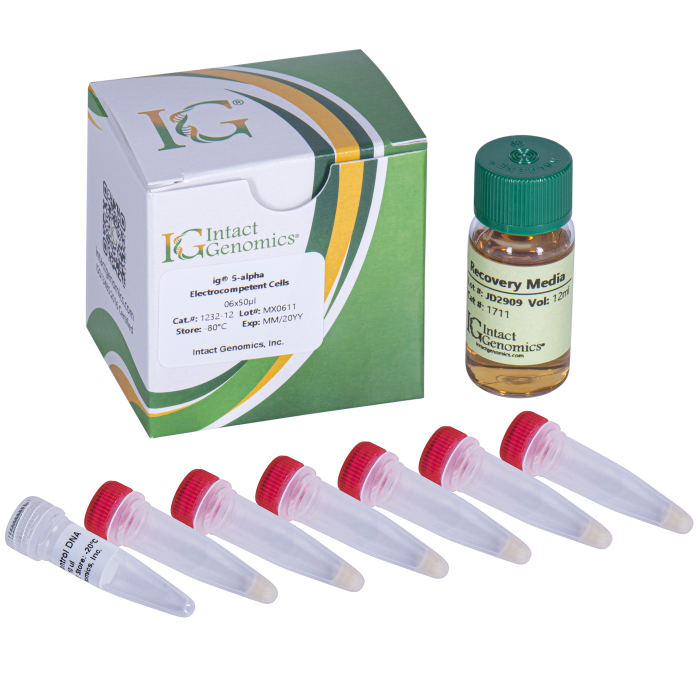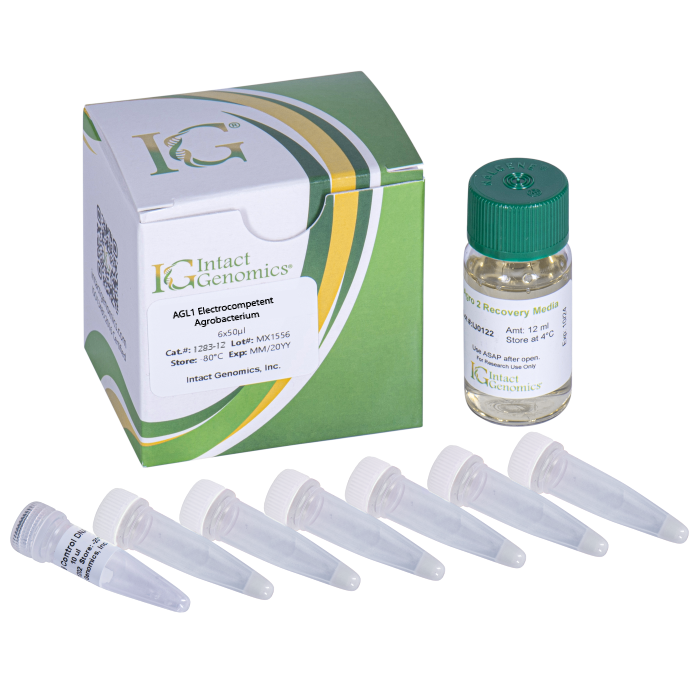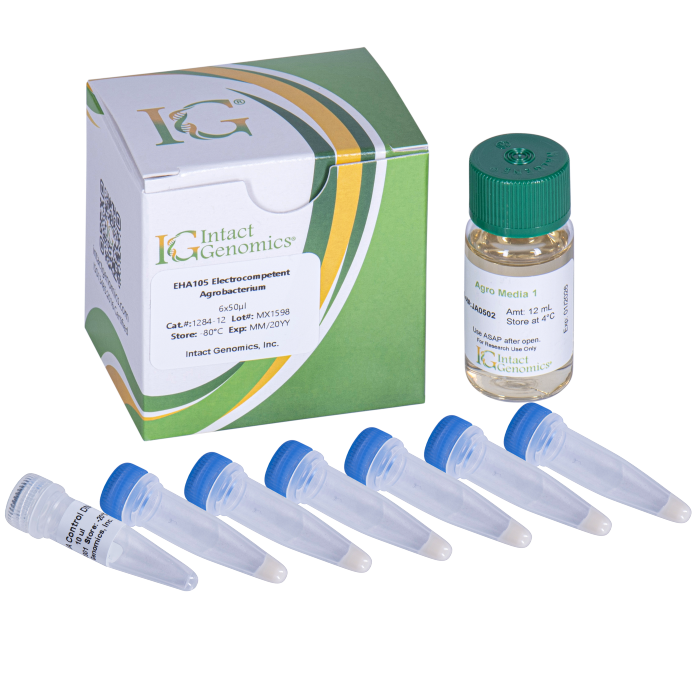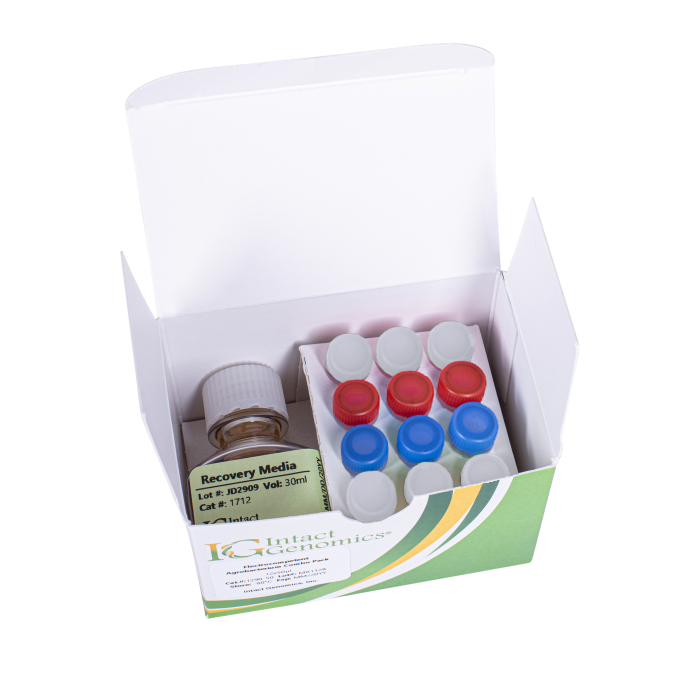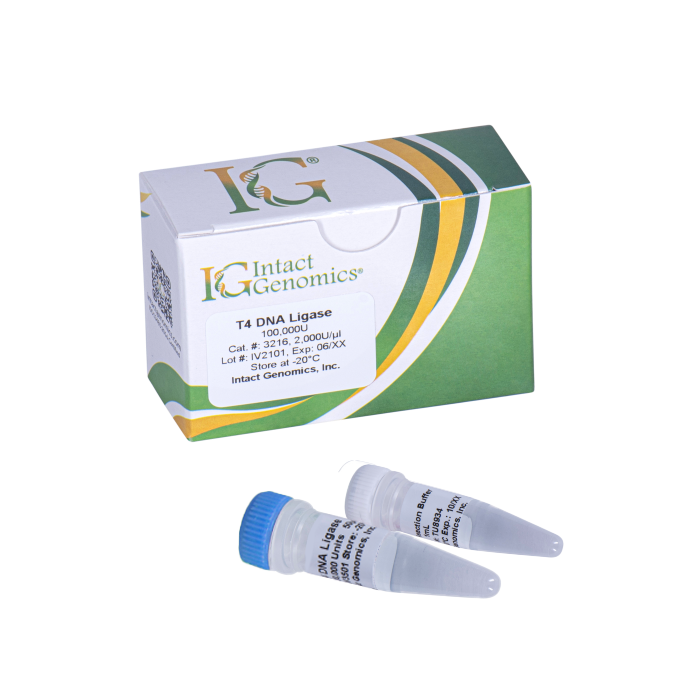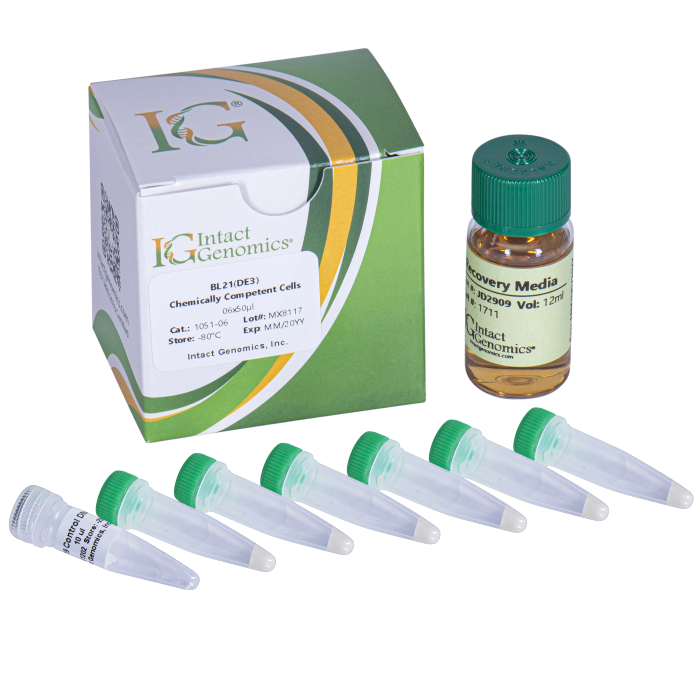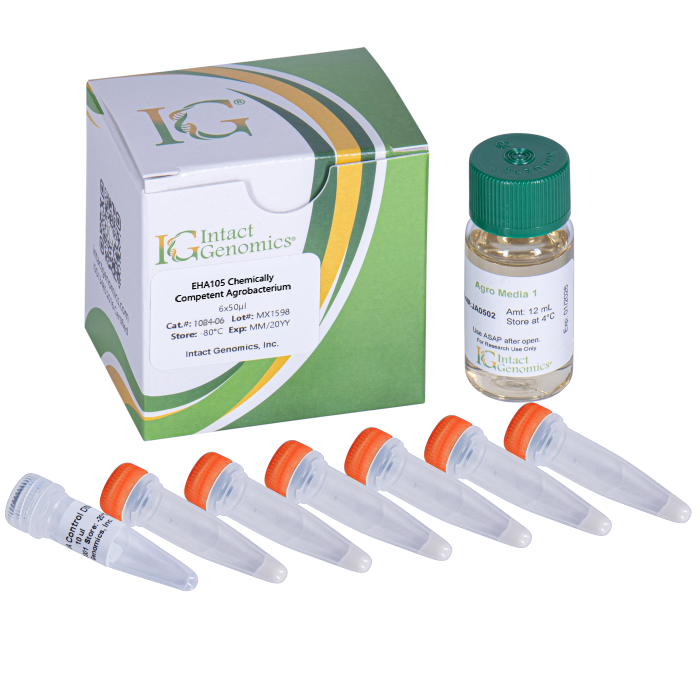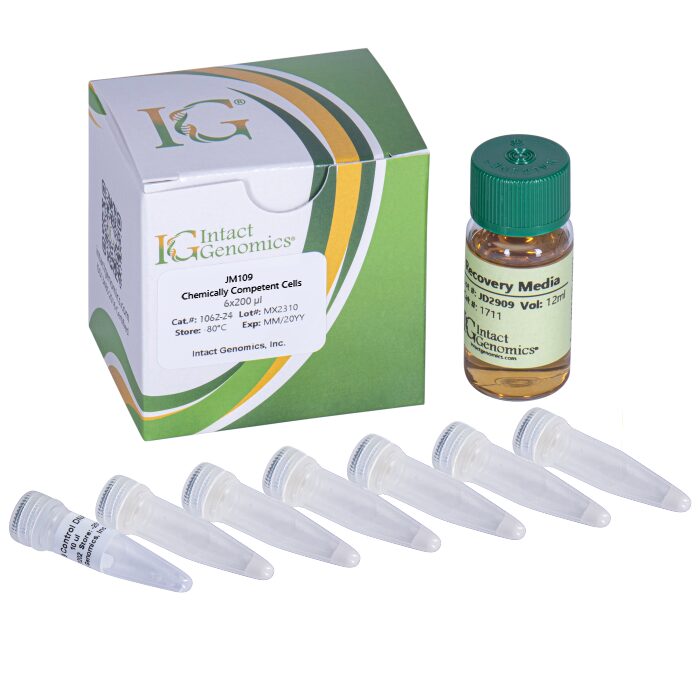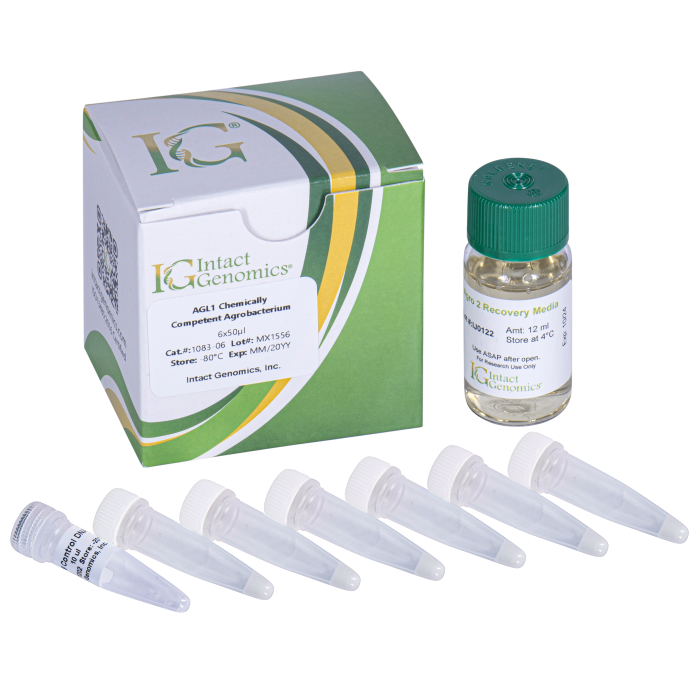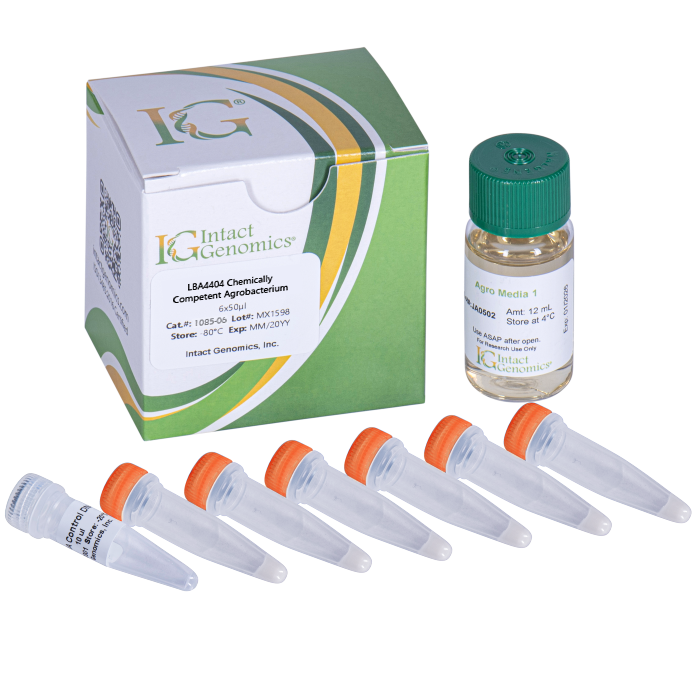The Agrobacterium Chemically Competent Combo Pack contains 3 50µl aliquots of GV3101, AGL1, EHA105 and LBA4404 along with pCambia and our proprietary Agro Recovery Media.
Agrobacterium Chemically Competent Combo Pack
$716.00
Description
Intact Genomics Agrobacterium Chemically Competent Combo Pack is perfect for scientists who require multiple agrobacterium-competent cell strains for their research. The Agrobacterium Chemically Competent Cells Combo Pack contains 3 50µl aliquots of GV3101, AGL1, EHA105, and LBA4404 along with pCambia and our proprietary Agro Recovery Media.
The GV3101 strain has a C58 chromosomal background with rifampicin resistance and the Ti plasmid pMP90 (pTiC58DT-DNA) with gentamicin resistance. The GV3101 Ti plasmid has the T-DNA region sequences deleted and transformation with a binary vector containing the missing T-region results in a functional T-DNA binary system that allows for the transfer of genetic material into a host plant’s genome. Therefore, this system is often used for the Agrobacterium-mediated transformation of several dicots such as Arabidopsis thaliana, tobacco, potato, and monocots like corn.
The AGL1 strain has a C58 chromosomal background that carries an insertion mutation in its recA recombination gene which stabilizes recombinant plasmids. It also carries rifampicin and carbenicillin resistance in its genome for selection. AGL1 contains the Ti plasmid pTiBO542 from which the T-DNA region sequences have been deleted. Transformation with a binary vector containing the missing T-region results in a functional T-DNA binary system that allows for the transfer of genetic material into a host plant’s genome. Therefore, this system is often used for the Agrobacterium-mediated transformation of Arabidopsis thaliana as well as maize and other monocots.
The LBA4404 strain is useful for the transgenic operations of tomatoes, tobacco, and other plants. LBA4404 contains a rifampicin resistance gene (rif). LBA4404 strain also contains an octopine-type Ti plasmid pAL4404 without self-transport function, which contains the vir gene.
The EHA105 strain is useful for the transgenic operations of rice, tobacco, and other plants. EHA105 contains a rifampicin resistance gene (rif). EHA105 strain also contains an amber basic Ti plasmid pEHA105 (pTiBo542DT-DNA) without self-transport function, which contains the vir gene.
Storage
Agrobacterium Chemically Competent Cells: -80 ºC
pCAMBIA1391z control DNA: -20 ºC
Recovery medium: 4 ºC
Quality Control
Transformation efficiency is tested by using the pCAMBIA1391z control DNA supplied with the kit and using the protocol in this manual. Transformation efficiency should be ≥1 x 104 CFU/µg pCAMBIA1391z DNA. Untransformed cells are tested for appropriate antibiotic sensitivity.
1091-12</span
Additional information
| µl | 12×50µl |
|---|
Transformation Protocol
Use this procedure to transform Chemically Competent Agrobacterium cells. Do not use these cells for electrocompetent transformation.
- Place microcentrifuge tubes on ice.
- Remove competent cells from the -80 °C freezer and thaw completely on wet ice (10-15 minutes).
- Aliquot 1 µl ( 10pg -1 µg) of DNA to the chilled microcentrifuge tubes on ice.
- When the cells are thawed, add 50μl of cells to each DNA tube on ice and mix gently by tapping 4-5 times. For the pCAMBIA1391z control, add 1 µl of (500 pg/µl) DNA to the 50 µl of cells on ice. Mix well by tapping. Do not pipette up and down or vortex to mix, this can harm cells and decrease transformation efficiency.
- Keep tubes on ice for 5 minutes, and then transfer to liquid nitrogen for 5 minutes.
- Incubate tubes for additional 5 minutes in a 37°C water bath.
- Immediately add 950µl of Recovery Medium or any other medium of choice to the tube, pipette up and down three times to re-suspend the cells.
- Incubate tubes at 30 °C for 3 hours at 200 RPM.
- Dilute the cells as appropriate then spread 20-200 μl cells onto a pre-warmed selective plate. For the pCAMBIA1391z control, you may plate 50 μl of diluted transformants onto a YT plate containing 30 μg/ml gentamycin and 50 μg/ml kanamycin. Use a sterilized spreader or autoclaved ColiRoller™ plating beads to spread evenly.
- Incubate the plates for 2 – 3 days at 30 °C.

